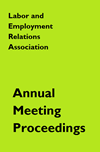The Role of National Governments in International Labor Standards
Abstract
The debate around international labor standards appears to be stymied by the lack of progress on several key fronts. The failure of the last WTO round and the lack of consensus on social dimensions of the Free Trade of the Americas Agreement (FTAA) have further signaled the need for making progress on the question of improving labor standards internationally. In this paper, we consider one of the most important stumbling blocks: the role of national governments (and by extension, sub-national governments such as state or provincial governments). Recent debates and developments surrounding international labor standards raise the question of the role of national governments in this process. A number of private developments such as corporate codes of conduct, international standards such as the SA8000 promoted by Social Accountability International, and various certification schemes (e.g., the Fair Labor Association [FLA]) and reporting schemes (e.g., Global Reporting Initiative) suggest a somewhat limited role for national and sub-national governments.Downloads
Issue
Section
2004 San Diego, CA Proceedings

